A rental-car guy told me this morning that today is Good Friday. An hour later an ex-girlfriend told me she’s visiting her parents for Passover tomorrow. If not for them I would be thinking about this weekend like any other. No holiday seems very important these days. Religious ones especially. At best, I’m guessing, Easter Sunday is regarded by regular Joes in the same light as President’s Day and Martin Luther King Day. If that. I remember giving a damn about Easter when I was a kid. I played a Roman soldier in a little Easter Sunday pageant in my local Episcopalian church when I was ten or eleven. I hunted for chocolate eggs when I was younger. It all fades away.
Month: April 2009
Again, Mike’s Murder
Yesterday’s article about movies that never made it to DVD (i.e., “The Disappeared“) got me thinking again about James Bridges‘ Mike’s Murder (1984), which I wrote about 13 months ago. The point was to urge Warner Home Video to release it on DVD, and if possible to release the original Bridges cut. A print of this version exists, according to Bridges’ longtime partner Jack Larson (with whom I spoke after the article was posted). And so I’m basically bugging WHV’s George Feltenstein again, is what it comes down to.
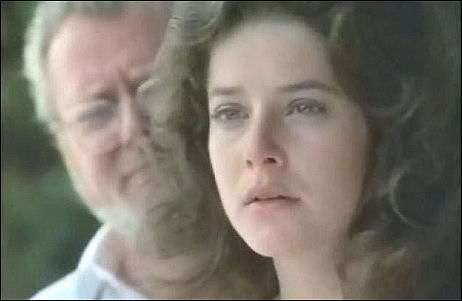
Here’s Pauline Kael‘s mini-review: “Debra Winger, in a superb full-scale starring performance, as a radiantly sane young bank teller in LA who has an affair with a curly-haired clear-faced young tennis instructor called Mike (Mark Keyloun). It’s a wobbly affair: She hears from him randomly over the course of two years — whenever the mood hits him, he phones her. One night, he’s supposed to come over late, but he doesn’t show. When she gets a call telling her he’s dead, it’s abrupt, bewildering. She can’t let go of him so quickly, and she tries to find out everything she can.
“Winger has thick, long, loose hair and a deep, sensual beauty in this movie. James Bridges, who directed, wrote the role for her after directing her in Urban Cowboy, and her performance suggests what Antonioni seemed to be trying to get from Jeanne Moreau in La Notte , only it really works with Winger — maybe because there’s nothing sullen or closed about her. The picture is atmospheric yet underpopulated; at times, it feels thin, and it turns into overheated melodrama in a sequence featuring Darrell Larson.
“But its view of the cocaine subculture (or culture) of LA is probably Bridges’ most original and daring effort, and it has a brief, intense appearance by Paul Winfield (as the record producer who brought Mike to LA) that’s right up there with Winger’s acting. With Brooke Alderson, Robert Crosson as Sam, and Daniel Shor as Richard, the performance artist. The Warner executives refused to release the picture until Bridges made some cuts and changes, and they probably breathed a few sighs of relief as they buried it.”
Here’s part of what I wrote last March: “It didn’t register very strongly in the mid-Reagan era because it didn’t shoot for the stratosphere or deliver fierce visceral thrills, which is what audiences seemed to be responding to more and more back then. (The ’70s heyday had drawn to a close, and blunt-impact movies — sci-fi epics, actioners, tits-and-zits comedies — were gaining big- time.) But it handled itself and its subject — the L.A. drug-dealing scene — in a way that was almost deceptively powerful. It’s a sad and somber little piece that leaves a haunting after-vibe.
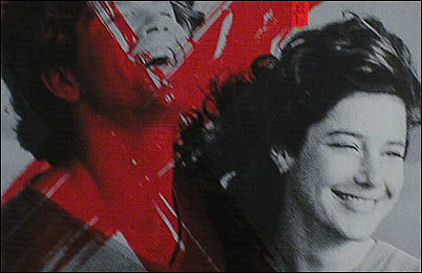
“And it had some unusually penetrating performances from Debra Winger, Paul Winfield, Mark Keyloun (a newcomer at the time who seemed to work mostly on television after Mike’s Murder and who retired from acting in the early ’90s) and Darrell Larson. There was real ache and loneliness in their emoting. Which lent unusual gravity to a story that structurally was only a murder-mystery.
“I wish I could find at least a fragment of Kael’s New Yorker review online. I remember how her review noted that a N.Y. Times TV page editor had written ‘skip it’ in response to an airing of Mike’s Murder on a New York-area station, and Kael saying in response, ‘Please, don’t skip it.’
Winger plays Betty, a practical minded but lonely bank teller living in Brentwood. She falls for Mike, a light-hearted tennis instructor (Keyloun) who spends a single night with her after a brief flirtation. He’s obviously immature and irresponsible, not returning calls and whatnot, but she can’t let him go. Then after he doesn’t show up for a date, Betty learns to her shock that he’s been slain by drug dealers.
“And so she decides to assuage her pain by looking into his sordid past to learn what happened, and the journey she takes into the toney, drug-dealing underworld that gives Mike’s Murder its strange, unsettling edge.
“An IMDB posting by James Sanford says that Mike’s Murder has “a beautifully evoked, vaguely creepy atmosphere that hangs over every scene….the crime that sets the story in motion remains unsolved at the end, and perhaps that’s how it should be. It’s not important who really killed Mike Chuhutsky, Bridges seems to be saying. Not when it’s so obvious what killed him.”
“It’s been over ten years since I’ve seen Mike’s Murder, but I remember three things in particular: (a) the look of immense sadness on Winfield’s face as his character, a wealthy gay man who had a thing for Mike, considers the character flaws that led to his death, (b) the horrific howl that comes out of Larson, Mike’s not-very-smart best friend, as he’s about to be murdered by thugs for having stolen cocaine from a major dealer who lives in the hills, and (c) a nifty little sequence in the very beginning that shows a hamburger being prepared at Tomy’s on Pico Blvd.”
Off Balance
It seems lamentable that poor Liam Neeson, who’s probably (and of course understandably) not fully himself in the wake of Natasha Richardson‘s death, has agreed to play Zeus, for God’s sake, in a remake of Clash of the Titans under director Louis Leterrier (Transporter 2, The Incredible Hulk). I’m thinking back to Neeson’s expressions of despair in the late ’90s after starring in the double-whammy blue-screen nightmare of Star Wars: The Phantom Menace and The Haunting. He wanted to quit acting, if I correctly recall.
Ralph Fiennes (who has a memorable cameo in The Hurt Locker ) is scheduled to costar in the new version, which is being funded by Warner Bros. It’ll begin production in England later this month.
Laurence Olivier played Zeus in the original 1982 Clash of the Titans — strictly paycheck, an all-time career low.
Hard Life
Nobody invited me to see The Mysteries of Pittsburgh (Peach Arch, opening today in NY and LA). I’ve asked the film’s p.r. reps if I can get a screener from them so I can sit in a Starbucks somewhere in Manhattan and watch it on my computer. If that doesn’t work I guess I’ll actually pay to see it this afternoon. Because I know Peter Sarsgaard’s performance will be engaging (because he always is), and because I’ve always wanted to see it (despite the buzz) as a way of paying tribute to Sienna Miller‘s ballsiness is calling Pittsburgh “shitsburgh.” She earned my lifelong respect with that one quote. On top of which Pittsburgh deserves the sobriquet — I’ve been there.
Of course, I had a sense from the get-go that The Mysteries of Pittsburgh might be a problem movie. I suspected this when I saw that the director’s name was Rawson Marshall Thurber. That’s one too many names, man. That’s the name of a guy with ego issues or family issues or something. It sounds southern, literary, to-the-manor-born and pretentious as hell. I remember Francis Coppola announcing back in the early ’80s that he was officially dropping “Ford” as his middle name because he knew it sounded too high falutin’ and obnoxious.
Entertainment Weekly‘s Owen Gleiberman gave it a D, which is exceptional given EW’s tendency to grade on a curve. “The paradox of a truly atrocious literary adaptation,” he wrote, “is that everything on screen — a crummy postcollegiate job, a love triangle, even a ?burglary — must be embedded with little wisps of higher ”meaning,” and therefore ends up meaning nothing at all.
“In The Mysteries of Pittsburgh, a stillborn rendering of Michael Chabon’s first novel, Jon Foster plays Art Bechstein, the son of a Jewish gangster (Nick Nolte), but he comes off as the dullest of WASP preppies. His fascination with a young couple — heartfelt Jane (Miller) and her pretentious, chopper-riding, bisexual boyfriend Cleveland (Sarsgaard) — “plays like Gossip Girl written by a bad F. Scott Fitzgerald imitator.”
No Guts, No Glory
“If you thought Abu Ghraib was a laugh riot then you might love Observe and Report, a potentially brilliant conceptual comedy that fizzles because its writer and director, Jody Hill, doesn’t have the guts to go with his spleen.” — from Manohla Dargis‘s 4.10 N.Y. Times review.
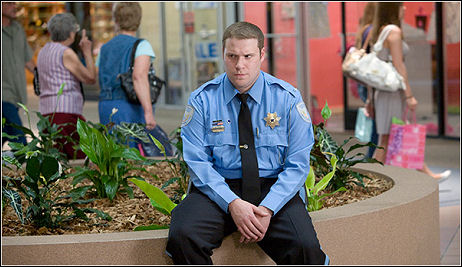
“Observe and Report might have been an interesting film if Hill had committed to the dark side and stayed there, but he wants it both ways: to get laughs for being mean and to shake it off and say, ‘No, I was just being goofy and playful.’ But Ronnie isn’t a playful construct; he’d be fascinating if there was consistency to him, if Hill had the depth or the guts to stick with the vision he initially creates. But Observe and Report wants it both ways and ends up with neither.” — from Marshall Fine‘s 4.10.09 review on Hollywood & Fine.
“Hill is a copout compromiser who lacks the courage of his interests and instincts. He’s made a semi-dark nerd-psychopath comedy and (just to be safe) a moronic, logic-free, dumb-ass Paul Blart comedy with an infuriating finale. Particularly for a film that is supposedly delving into the dark side and dealing with human derangement with at least a semblance of bluntness. — from my own 4.7.09 review, called “Citizen’s Arrest.”
The finale “ends on a note of triumph that’s curiously out of keeping with the movie’s own logic. All along we’ve been watching Ronnie slowly hoist himself on the petard of his own unchecked aggression. For there to be even a hint of redemption throws everything that came before into question, and breaks an unwritten contract with the viewer. What’s meant (I think) to be a ‘fuck you’ to action-movie conventions reads instead as a ‘fuck you’ to the audience. Observe and Report tickets should come with a free breath mint, because however hard you’ve been laughing, that ending leaves a seriously bad taste in your mouth.” – from Dana Steven‘s 4.10 review on Slate.
Connection
“I’ve been interviewed by people, I’ve met people willing to be my friend, I’ve met people who found me intriguing. But nobody has ever opened up that Pandora’s box [like James Toback]. Anybody else would think if you ask Mike this, [he’s] going to be upset. But Jim just came out and asked these questions and unlocked a bunch of things that were always in my mind but I would never approach people with them or comment on them. When he came to me on that level, I elaborated with him, and said I understand that way of thinking.” — Mike Tyson speaking to L.A. Weekly critic Scott Foundas about Toback and the relationship that led to Tyson.
Chop Chop
Since his perfectly tempered, career-changing performance as DJay in 2005’s Hustle & Flow, Terrence Howard has made a whole bunch of movies and done a fair amount of TV, and nothing has really worked all that well. Certainly not theatrically. Either the films he chose to make weren’t all that good or Howard wasn’t that good in them, or both. He seems to be pretty much going for the dough. I’m not saying he’s Cuba Gooding but he’d better watch it.

Fighting is the most recent. Before that was Iron Man, The Perfect Holiday, Awake, August Rush (bad), The Brave One, The Hunting Party (bad), Pride, Idlewild, Get Rich or Die Tryin’, Four Brothers. His best run so far was ’04 and ’05 when he made Crash, Ray, The Salon and Hustle & Flow. Quality- and luck-wise it’s been downhill ever since. You have to be in a really good film or land a really good part every four or five years. You can’t just cruise along and pocket the cash.
Shelf Life
Paolo Sorrentino‘s Il Divo (MPI, 4.24) is an immaculate, highly stylized film about former Italian Prime Minister Giulio Andreotti and his political career, particularly the events that led to revelations about his ties to the Italian mafia and his reported complicity in the murder of a journalist.
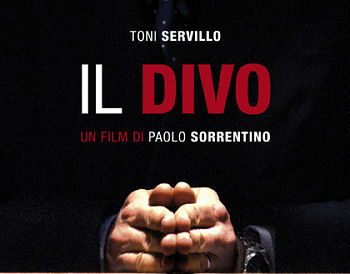
I saw it last year in Cannes, and my immediate reaction was basically (a) “a first-rate political drama but probably too Italian to play in the U.S.” and (b) “a brilliant Andreotti performance by Toni Servillo.” I’ll be seeing it again on 4.14 at a special tastemaker screening in midtown Manhattan. MPI is the U.S. distributor, but Focus Features chief James Schamus will be hosting.
Il Divo opened in Italy a few days after its 5.23.09 bow in Cannes. Most of the rest of the world saw it last summer and last fall. Now it’s finally opening here.
Some films are like fruit. They need to be picked when they achieve ripeness, and if you wait too long to eat them they’ll have a diminished quality — they’ll feel too soft and won’t taste as good. Too much time and dust and delay dilutes the potency. You have to see it in a relatively fresh state.
Of course, some movies age well, like wine, and when you wind up seeing them two or five or ten years after their initial theatrical release you sip them and go “aaahhh” — excellent! So is Il Divo fruit or wine? Maybe it’s both. I haven’t decided yet.
A friend thinks I’m a bit off on my shelf-life ttheory. “Many films have come out a year after their Cannes premieres — The Wind That Shakes The Barley (which did very well here), The Last Mistress, Flight of the Red Balloon. I could understand where you’re coming from if Il Divo was a film that was so of-the-moment that its topicality or resonance would have really diminished over time (an Iraq-related film for instance) but Il Divo‘s themes of political power and corruption are pretty evergreen. And its formal brilliance can never age”
Noted
“I don’t know if you know this, but both the MGM and Universal film library have been fully converted to HD format,” a friend writes. “Many of the titles (including some of the films that you mentioned earlier today) are being withheld from consumer distribution so that they can be shown exclusively on HD cable channels that Universal owns.”
The Disappeared
There are plenty of lists of highly regarded films that need to be given an upgrade and a fresh release on DVD or Bluray. The much bigger category, of course, are films that were issued decades ago on VHS (or were never released at all), and need to make their DVD or digital download debut. I’ve been clamoring for years for the release of DVDs (at the very least) of David Jones‘ Betrayal, Frank Perry‘s Play It As It Lays and John Flynn‘s The Outfit, as HE regulars well know.

I scanned through this Pauline Kael capsule review site for some titles that would be at least somewhat diverting to have on DVD or Bluray or both. What I came up with, mostly, was mediocre but watchable junk. Some have cloudy reputations, some were directed by “made” guys, some had good casts, a few starred Sandy Dennis and others are just oddball failures and half-and-halfers from the ’50s, ’60s, ’70s and ’80s.
But older junk has an intrigue that newer junk lacks. Second-tier diversions ain’t what they used to be. 21st Century blow-chunk levels are appalling. Now you get nervy throw-away crap from guys like Jody Hill with their baseball caps and seven-day beard growths and fat asses. Back then crap seemed…I don’t know, tidier or something. A bit more layered and better prepared. Sometimes you got an awkward fumble or flat-out failure from the likes of Robert Mulligan, Mark Rydell, Paul Mazursky, etc. And if you were stuck with a major stinker, there was at least a nude scene or some gratuitous sex thrown in. It was the fashion back then.
I’ve listed about eleven titles for starters. I might not want to own these films, but I’d definitely rent them. Some of them are better than crap-level but they’ve faded from circulation out of boredom or irrelevance. There are hundreds more that make the grade in this sense. I might even run a Part Two tomorrow.
Alex in Wonderland (1969) — director: Paul Mazursky. Cast: Donald Sutherland, Ellen Burstyn, Michael Lerner, Mazursky.
The Actress (1953) — director: George Cukor. Cast: Jean Simmons, Spencer Tracy, Teresa Wright, Anthony Perkins (making his debut), Jackie Coogan.

The Legend of Lylah Clare (1968) — director: Robert Aldrich. Cast: Peter Finch, Kim Novak, Ernest Borgnine.
In The Cool of the Day (1963) — director: Robert Stevens. Cast: Jane Fonda, Peter Finch, Arthur Hill.
That Cold Day in the Park (1969) — director: Robert Altman. Cast: Sandy Dennis, Michael Burns, Susanne Benton, David Garfield, Luana Anders, Michael Murphy.
Up The Down Staircase (1967) — director: Robert Mulligan. Cast: Sandy Dennis, Patrick Bedford, Eileen Heckart, Ruth White, Jean Stapleton.
The Fox (1967) — director: Mark Rydell. Cast: Anne Heywood, Sandy Dennis, Keir Dullea.
Thumb Trippin’ (1972) — director: Quentin Masters.
Midas Run (1969) — director: Alf Kjellin. Cast: Anne Heywood, Richard Crenna, Fred Astaire, Ceasar Romero.
The legendary At Long Last Love (1973) — director: Peter Bogdanovich. Cast: Burt Reynolds, Cybill Shepherd, Madeline Kahn, Duilio Del Prete, Eileen Brennan.
Brewster Mccloud (1972) — dierctor: Robert Altman. Cast: Bud Cort, Sally Kellerman, Michael Murphy, William Windom, Shelley Duvall, Rene Auberjonois, Stacy Keach.
Unfashionable!
Who wrote this mini-review of Barry Lyndon, and what’s happened to this viewpoint (or ones in this general realm) among the 21st Century film culture elite? I’ll tell you what’s happened to his viewpoint. It’s been decreed, elbowed and pooh-poohed out of existence. Well, enough of that. It’s high time for a backlash, dammit. Into the doghouse with Barry Lyndon! A rarified one, I mean. The kind that houses a very rare breed of movie that is simultaneously brilliant and over-praised, and which many have watched 15 or 20 times.
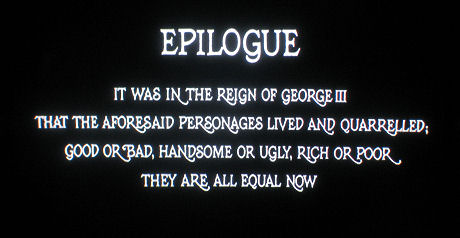
“Thackeray wrote a skittish, fast-moving parody of romantic, sentimental writing. It was about the adventures of an Irish knave who used British hypocrisy for leverage. However, it must have been Barry Lyndon’s ruthless pursuit of wealth and social position rather than his spirit that attracted Stanley Kubrick. His images are fastidiously delicate in the inexpressive, peculiarly chilly manner of the English painters of the period-the mid-18th century-and it’s an ice-pack of a movie, a masterpiece in every insignificant detail.
“Kubrick suppresses most of the active elements that make movies pleasurable. The film says that people are disgusting but things are lovely. And a narrator (Sir Michael Hordern) tells you what’s going to happen before you see it. It’s a coffee-table movie; a stately tour of European high life [that’s] like a three-hour slide show for art-history majors.”
Almost every hip film aficionado and filmmaker you might run into these days swears by Lyndon, and nobody ever says or writes anything like the above. The Lyndon cult is so dug-in and well-established that it’s almost become a fascist dictatorship. There is only one way to process the emotional bloodlessness of Barry Lyndon, and that is to call it timeless, exquisite, masterful, etc.
My view has always been that it dies after Barry marries Lady Lyndon, or the simple reason that his coarse selfishness — the thing that ensures his social and financial downfall — seems to come out of nowhere.
It comes down to simple visual pleasures…yes. The thought-out, strongly fortified kind that has led me to watch the Barry Lyndon DVD 15 or 20 times, even thought I don’t care for the funereal second half. I sit through this section only because I love the Lord Bullington duel sequence and the final epilogue card that states, “Good or bad, handsome or ugly, rich or poor, they are all equal now.”
“We’ll See About That”
A much cooler trailer for Michael Mann‘s Public Enemies (Universal, 7.1.09) than the one that popped through a month ago. More emphasis on John Dillinger (Johnny Depp) enjoying the role of America’s mythical/populist gangster of choice, and a bit more emphasis on doppelganger Melvin Purvis (Christian Bale) and girlfriend Billie Frechette (Marion Cottillard).
But what’s with the mincingm high-pitched British accent that Billy Crudup uses in his performance as J. Edgar Hoover? He sounds like Marlon Brando in Mutiny on the Bounty.
